How to pick the highlights? Wow, what an awesome day that was at the second day of the conference! I am absolutely blown away by the experiences I have had today! Right from the brilliant key notes sessions, to AMAs with inspirational experts, to having a hearty conversation with the Gurus of testing – a surreal day for me in all honesty! To me, this is the power of the conference – it makes these interactions possible, if fills you with boundless inspiration!
Keynote Sessions
These sessions were a big highlight of EuroSTAR 2020 Day two and brought great perspectives to the audience. The first keynote delivery was from Ronald Cummings-John on the topic of ‘Develop a quality narrative that communicates the true value of quality’. This topic is perhaps universally relevant as helping everyone in the organisation understand the value of testing is perhaps as important as testing itself! He reinforced the message of how important it is to understand the perception of quality in the organisation, understanding product maturity and growing the influence. Through the concept of ‘epiphany bridge’, he elaborated how to get the buy-in from team around. He also explained the idea of using growth metrics make the case stronger in the narrative. The session ended with a powerful message of ‘You are tomorrow’s quality leader’.
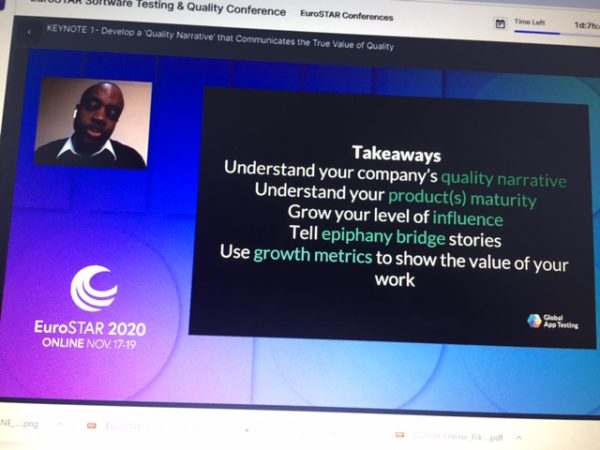
The second keynote session was by Abby Bangser on ‘Unlock the power of testing with observability’ which was highly effective. Through some case studies Abby established the importance of studying key aspects of the product behaviour in production environment using the three pillars which are metrics, logs and traces. Her approach was incredibly convincing in how the tester’s only goal is often limited to achieving sign off but the feedback loop on how the product worked for the actual end users is missing. Some of the most important observations come from production where a product is being experienced in real life and this is a key area of learning. Given the risks involved in such a method, she went on the highlight how it can be achieved safely using techniques like shadow testing and progressive delivery. The audience posed numerous questions around what it takes to achieve this, risks involved, stakeholder engagement etc. This session clearly left a great impression on all participants and helped reflect on the benefits of this concept.
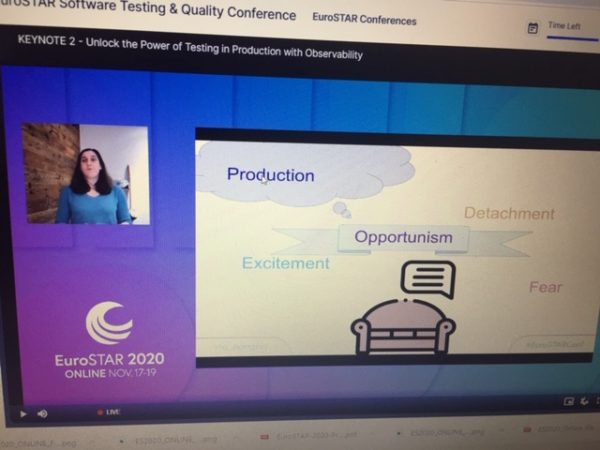
The final keynote session was from the maestro Michael Bolton who in his inimitable style delivered a great session, in an unusual format too! Instead of a presentation he chose to be in conversation with programme committee member Zeger Van Hese. His topic of ‘Let us talk about problems’ focussed on how as testers we need to embrace, study and learn from problems that leading to a solution delivery. He asserted the importance of questioning in our role like querying the product, its intent, its audience, what could be wrong with it, who could be missed etc. He highlighted how a tester’s role is not to prevent problems but to alert people about a problem. He mentioned the benefit of ‘interactional expertise’ where testers develop the ability to be involved in discussion about the rest of the product development, like coding, but not be carrying it out. An excellent session which gave plenty food for thought on how we approach our roles in testing.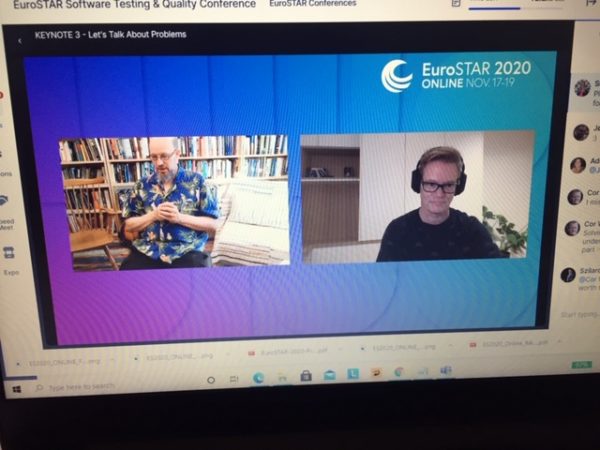
Track sessions
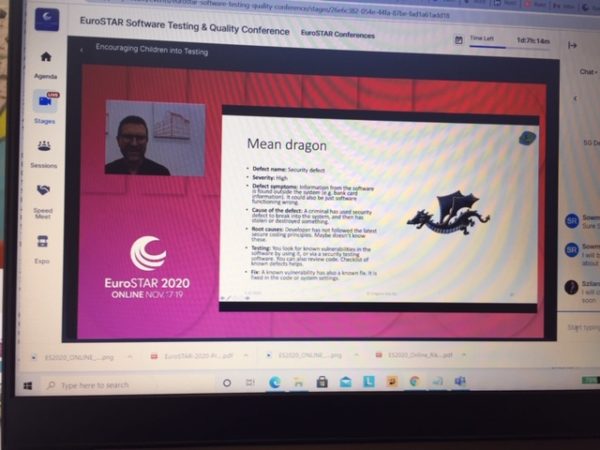
There were some fantastic track sessions in the schedule, making it very difficult for me to choose from! As a parent of young children, I couldn’t help but attend the session ‘Encouraging children into testing’ by Kari Kakkonen who has written a book titled ‘Dragons out’ about educating children on testing. He made a very interesting point about how kids are often involved in learning activities around coding but hardly anything is taught about testing. He illustrated how the best techniques to help children learn like storytelling. He shared the idea of ‘dragons’ to represent defects – he has created various dragons to represent different kinds of defects from categories functionality, performance, security etc. It was such an interesting concept that I am motivated to get my children to get involved too!
The next session I attended in the morning half was John Wright session on his experience of crowd testing for an app for contact tracing. Through a range of tools and techniques he highlighted the challenges of this exercise and how he overcame them. It was truly inspirational to see the amount of thought that had gone into the crowd testing endeavour, taking into consideration like neuro-diversity, linguistic barriers etc. With the core idea of ‘shift right’, this is an example of how valuable testing can prove in addressing any real life problem.
In the afternoon I first attended the session ‘Your habitat is changing, are you?’ by Ryan Volker. The topic was highly relatable to one and all. He established the idea of various threats, sources of change affecting one as an individual or the ecosystem we operate in. He provided some suggested approaches on how to deal with them. Ryan very effectively narrated the benefits of to getting comfortable being uncomfortable, helping others growing and periodically going away from testing role to get an objective view. Later in the afternoon I also attended a session by Raj Subrameyer on ‘How to avoid burnout in tech industry’ which again felt like a highly relevant topic. Raj shared interesting hacks under the categories of ‘planning’ and ‘mindfulness’. While as part of planning he gave very practical tips on cutting down on meetings and their duration, he also highlighted the importance of email best practices to. Under mindfulness he shared the idea of focussing and defocusing through practical examples. A much needed perspective on well being for people working in technology, more so in current times.
Connections in the Huddle
AMA with DevOps expert was a fabulous experience! Attended by a large number of audience, the session had excellent audience participation – Szilard provided excellent pointers and inputs with aplomb, highlighting some of the facts and myths around DevOps implementations. His depth of knowledge and understanding of DevOps concept created a highly engaging and informative session for the participants. The next AMA session was a dream come true opportunity for me to interact with legendary testing professional Dot Graham, whom I consider a role model. The incredibly affable and deeply knowledgeable Dot held the session with ease, grace and warmth – it made me develop more respect for her humility and wisdom. She addressed queries around automation which is a key area of her work and also shared insightful observations around trends in testing. The final interaction for the day as a volunteer was with blogger Brendan Connolly. Brendan shared excellent tips around writing, the benefits, the tools, possible sources of ideas etc.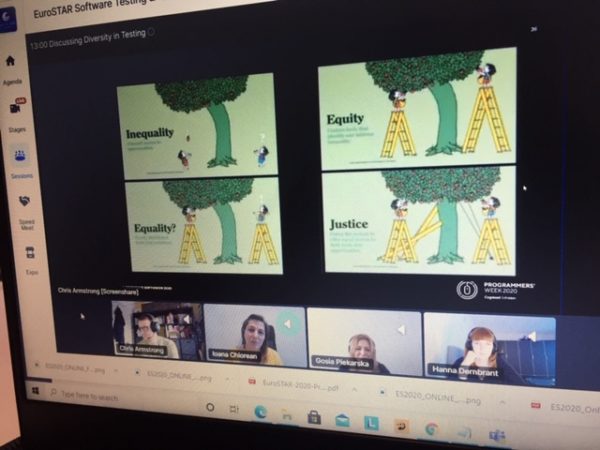
I was also a part of Hangout Café, talking to fellow participants about a range of topics – right from pandemic to parenting, there was a casual banter which was very relaxing! I attended briefly the testing clinic where fellow volunteers Dorota Koczar and Russell Craxford provided expert advise on all things testing. There were some interesting questions from the audience who had queries which were related to strategy, technical and resourcing related matters too. The session that also caught my attention was ‘Diversity in testing’ by Ioana Chiorean. Ioana delivered some amazingly powerful messages around the importance of ensuring inclusion as part of testing. By drawing an analogy with going to a party, she elaborated how Diversity is being invited to a part, Inclusion is to be asked to dance and Belonging is to dance like nobody is watching! It highlighted the significance of ensuring inclusion right from the start as testers, question the default and play a proactive role in enabling equality.
Feedback Session
The reporter session room at the end of the day turned out to be a pleasant surprise of sorts! Firstly Michael Bolton appeared to share some thoughts on the conference this year and subsequently the room was graced by none other than chairman Rik Marselis, Dot Graham, Dawn Haynes. There was a great discussion about the online conference – the pros and cons of it, possible formats for future events came up too. Rik the current chairman shared some experiences of bringing the conference together and Dot, who was the first ever conference committee chairman back in 1993 reminisced on how long the conference had come since its conception. The three seasoned speakers went on to encourage testers to consider speaking or to write blogs on their experience, to share their story which is always unique. I thoroughly enjoyed this unplanned but highly engaging interaction!
The final day of EuroSTAR 2020 conference has a lot in store for everyone. For me there would be a great opportunity to speak to Ryan Volker on soft skills for testers, a highly relevant topic for the community. Also a chance to interact with more experts through AMA, not to forget the fantastic line up of track sessions! It is bound to be a day of packed action and is being awaited by a keen audience – wishing a great day ahead for everyone at the conference!
See what’s happening for 2021 EuroSTAR Conference. The Call for Speakers opens on 7th December to 7th February so why not make 2021 YOUR year to take to the EuroSTAR stage!
Check out all the software testing webinars and eBooks here on EuroSTARHuddle.com
